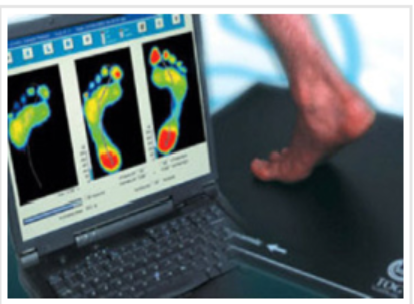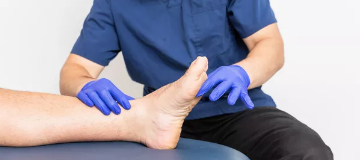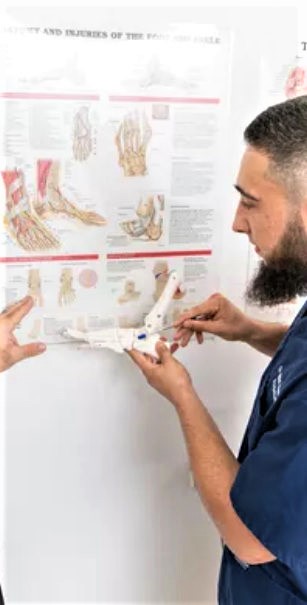Pigeon Toes
Sydney podiatry clinic
providing diagnosis and
treatment for Pigeon Toes.
providing diagnosis and
treatment for Pigeon Toes.
What are Pigeon Toes?
Pigeon Toes, medically known as in-toeing, is a condition where the feet point inward when walking or running instead of aligning straight ahead. It’s most commonly observed in children and is usually identified when the child starts walking. While it may seem concerning, in many cases, Pigeon Toes correct themselves without intervention as the child grows. However, if in-toeing is severe, persists into older childhood, or is associated with other symptoms such as pain or difficulty walking, it may require professional attention.

Causes of Pigeon Toes
Pigeon Toes can be caused by different conditions affecting the foot, lower leg, or hip. These include:
Metatarsus adductus: This is a common foot condition present at birth, causing the front half of the foot, or the forefoot, to turn inward.
Tibial torsion: This condition causes the child’s lower leg to turn inward. It can be present at birth or develop as the child grows.
Femoral anteversion: This condition affects the child’s thigh bone, causing it to turn inward. Children with femoral anteversion often sit in the “W” position.
Pigeon Toes are usually identified during infancy and early childhood, and the exact cause is often not known. While genetics can play a role, it is thought that position in the womb can also influence the development of these conditions.
Metatarsus adductus: This is a common foot condition present at birth, causing the front half of the foot, or the forefoot, to turn inward.
Tibial torsion: This condition causes the child’s lower leg to turn inward. It can be present at birth or develop as the child grows.
Femoral anteversion: This condition affects the child’s thigh bone, causing it to turn inward. Children with femoral anteversion often sit in the “W” position.
Pigeon Toes are usually identified during infancy and early childhood, and the exact cause is often not known. While genetics can play a role, it is thought that position in the womb can also influence the development of these conditions.

Why Choose Us
At the Podiatry & Injury Clinic, we don’t just treat conditions – we treat people. Our Sydney podiatrists understand that each individual’s situation is unique, and so should be their treatment. We focus on creating personalised treatment plans aimed at alleviating your discomfort and promoting healing.
Pigeon Toes Treatment
Our comprehensive approach to treating Pigeon Toes sets us apart as a trusted Sydney podiatrist. From thorough examination and diagnosis to custom-tailored treatment plans, we take each step meticulously to ensure the best possible outcomes.
Book online
If you suffer from any foot condition or experience pain, come and see our friendly experts at the Podiatry and Injury Clinic

We Treat Pigeon Toes
Our Sydney podiatrist is expert at diagnosing and fixing Pigeon Toes, and helping you recover from any related injuries.

Symptoms of Pigeon Toes
The main symptom of Pigeon Toes is an inward turning of the feet when walking or running. This may cause the child to trip or stumble more frequently than other children. In some cases, the child may complain of pain or discomfort in their legs or feet, especially after long periods of activity.
Complications of Pigeon Toes
In most cases, Pigeon Toes don’t cause significant problems and resolve on their own over time. However, if the condition persists into late childhood or is associated with pain or difficulty walking, it may lead to complications like difficulty in sports, social issues due to appearance, or physical discomfort.
How to Prevent Pigeon Toes
Prevention of Pigeon Toes isn’t usually possible, as the condition often develops before birth or during early childhood. However, encouraging your child to engage in regular physical activity can promote healthy development of the feet and legs.


Frequently Asked Questions
Can Pigeon Toes be treated without seeing a Sydney podiatrist?
While many cases of Pigeon Toes resolve without intervention, it’s recommended to consult a Sydney podiatrist if the condition is severe, causing pain or difficulty walking, or persists into late childhood.
Are Pigeon Toes a sign of an underlying condition?
Pigeon Toes themselves aren’t usually a sign of a serious underlying condition. However, severe or persistent in-toeing could indicate an issue with the bones of the leg or hip.
What treatment options does a Sydney podiatrist provide for Pigeon Toes?
Treatment options at our Sydney podiatry clinic may include observation, exercises, casting, or in rare cases, surgery.
At Podiatry & Injury Clinic, our Sydney podiatrists are here to ensure that foot issues like Pigeon Toes don’t stand in the way of your child’s active and healthy life. We provide a range of treatment options tailored to each child’s specific needs and circumstances.
Latest Blog Post
GET IN TOUCH
WITH US
What is your name?
